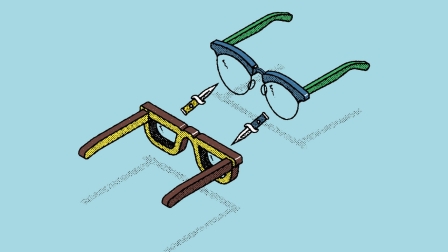Warby Parker And Shinola Fight To Be The Millennials’ Choice In Authentic Retail
Let’s address the obvious first: You don’t think that Warby Parker and Shinola are rivals. As of this moment, you’re right. Warby Parker predominantly sells eyewear, while Shinola deals in watches and leather goods. But the countdown clock on their future rivalry started in January when Shinola founder Tom Kartsotis told The New York Times that he plans to introduce eyewear in 2017, and he added that he expected it to rapidly become his largest revenue driver.
Shinola signaled that it would soon be engaged in a pitched battle with Warby Parker to be the specialty-retail tastemaker to millennials. Each company has amassed dedicated fan bases who want a little meaning and a warm, do-gooder feeling packaged with their accessories. At the same time, both are expanding into new categories and new cities, pushing the boundaries of their brands. So whose vision of an authenticity-focused aspirational lifestyle is most attractive to people who believe that the soul of a company is as meaningful as its products?
The Warby Parker experience inside its corporate headquarters illuminates what makes the brand special. When the elevator doors open on the sixth floor of its offices on the cusp of SoHo and Tribeca, you’re in a store, and such a compelling one that there’s a woman who came here for a meeting, but is about to buy a pair of $95 sunglasses. None of the employees look older than 30, and the white marble tables, light-wood shelves, and midcentury-modern accents glow in natural light from the nearly floor-to-ceiling windows. Rows of low bookshelves showcase cult favorites like Carl Wilson’s critique of Celine Dion, Let’s Talk About Love: A Journey to the End of Taste. A few shelves away there’s a Warby Parker–published book, Daydreamer’s Rx, with cartoons of “prefabricated fantasies” designed to spark imagination. And undergirding it all: The fact that, by buying its products, Warby customers have provided glasses to more than a million people in need.
A little less than a mile away, Shinola’s flagship store in Tribeca sits on a quiet cobblestone street. Inside the door, you pass through a thick velvet curtain into a café called the Smile Newsstand, a micro version of the downtown hipster restaurant-retail concept. It is currently serving coffee to a line of finance bros. To get to the watches, bikes, and leather goods, you pass a wall lined with portraits of people who assemble these products. There’s Tiara, with braids and a pinched expression, who does “leather,” and Stefan, smiling, a loupe poking up off his forehead, who does “watches.” A sign next to them reads: A TRUE MANUFACTURING COMPANY IS BUILT NOT BY THE THINGS IT MAKES. IT’S BUILT BY THE PEOPLE WHO MAKE THEM.
Shinola has staked its brand on the idea that making something in America, and especially in American cities that need jobs most, will inspire well-off buyers to open their wallets. The $2,950 bicycles and $75 pens (and baseball mitts and, soon, audio equipment) are merely a way for them to help the underdog, the American working class, get back in the business of high-quality craftsmanship. Shinola has so connected itself to being part of an American manufacturing comeback story, particularly in Detroit, that President Obama recently gave U.K. Prime Minister David Cameron a custom-made Shinola watch. The company’s move to assemble eyewear on Chicago’s South Side, a neighborhood that could use a few jobs and some good news, goes right to the heart of the one weakness in Warby Parker’s buy-one, give-one strategy: Its eyewear is made overseas, and most of the people in need who receive its donated glasses are also international. Why not help your fellow Americans, like Tiara and Stefan, with a job?
It’s a powerful message, but there’s one rub: Crain’s Detroit Business reported that, prior to founding Shinola, Kartsotis—who previously built Fossil into a billion-dollar accessories brand—commissioned a study that concluded that people would rather spend $15 on a pen made in Detroit than $5 on one made in China. And if you can push the price points even more, all the better. As well-meaning as Shinola might be, there’s an unattractive gaudiness to the products and the high prices that can come across as arrogant.
Warby Parker offers reasonable prices and a more approachable, minimalist style. Its stores are fun places to hang out, featuring free photo booths and throwing parties—complete with popcorn and cotton candy—to celebrate the start of spring. Warby Parker’s extension into book publishing is good marketing: Pairing literature with eyeglasses makes sense. But it also doubles down on its fans, and it gives Warby Parker an enviable claim to the future of fashion and business. Advantage: Warby.
See inside Warby Parker’s inner circle in this episode of Power Couples:
A version of this article appeared in the July/August issue of Fast Company magazine.
Fast Company , Read Full Story
(23)


